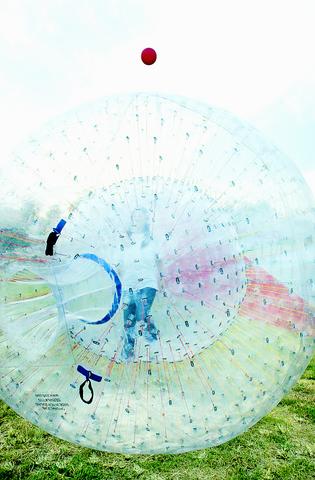Back to school sales are in full gear as Western-style hypermarts joggle to win over students stocking up on school supplies and home electronics.
Over the last few weeks foreign mega-stores like UK-based Tesco Stores Co Taiwan (
"Back-to-school is a very important sales campaign in Tesco UK stores, and therefore our management team has transferred their experience to Taiwan starting last year," Sarah Wu (

PHOTO: CHEN CHENG-CHANG, TAIPEI TIMES
Entering Taiwan in 2000, Tesco currently has outlets in Taoyuan and Tainan, with a 100 percent share in and management control over its Taiwanese subsidiary.
The French management team at RT-Mart is also looking to capitalize on the millions of Taiwanese -- from kindergarten to college -- heading off to school in September.
"This is a new idea we learned from our foreign partners last year ? in Europe [our parent group] even offers "back to school shopping lists" for the convenience of customers," said Fiona Wang (王彤芳), a RT-Mart manager.
Establishing its first outlet in 1997 through the Taiwan-based Ruentex Group (
Wang explained, purchasing school supplies is a annual shopping event that was previously accomplished by parents running from store to store to find all their different needs.
"Hypermarts have the edge in offering one-stop-shopping at wholesale prices," she stressed.
Carrefour, well-versed in back to school sales, said the company did benefit from the campaign.
"This is the annual peak in selling school supplies, and sales [of this category] at this period account for 30 percent annual school supplies sales," said Lilian Lee (
In addition, our monthly sales jump some 20 percent because of this event.
School bags, lunch boxes and stationery splashed with popular cartoon characters such as Spiderman and South Park go over bigtime with elementary and high school students.
For freshmen just entering college and move out from parents' places, small appliances and computers are hot choices.
"Students always have tight budgets and look for durable stuff that will last them through their college years,? therefore hypermart is the best place to go, Lee added.
Entry-level desktop computers priced around NT$20,000 also hot items in hypermarts, with all three companies aiming to sell thousands of desktops during the run up to the ringing of the school bells.
Retailers also make use of the student surge to push electronic dictionaries, stereos, small refrigerators as well coffee makers to students.
"This has become a good opportunity not only for students but also for the general public to buy consumer electronics," RT-Mart's Wang said.

CAUTIOUS RECOVERY: While the manufacturing sector returned to growth amid the US-China trade truce, firms remain wary as uncertainty clouds the outlook, the CIER said The local manufacturing sector returned to expansion last month, as the official purchasing managers’ index (PMI) rose 2.1 points to 51.0, driven by a temporary easing in US-China trade tensions, the Chung-Hua Institution for Economic Research (CIER, 中華經濟研究院) said yesterday. The PMI gauges the health of the manufacturing industry, with readings above 50 indicating expansion and those below 50 signaling contraction. “Firms are not as pessimistic as they were in April, but they remain far from optimistic,” CIER president Lien Hsien-ming (連賢明) said at a news conference. The full impact of US tariff decisions is unlikely to become clear until later this month

Popular vape brands such as Geek Bar might get more expensive in the US — if you can find them at all. Shipments of vapes from China to the US ground to a near halt last month from a year ago, official data showed, hit by US President Donald Trump’s tariffs and a crackdown on unauthorized e-cigarettes in the world’s biggest market for smoking alternatives. That includes Geek Bar, a brand of flavored vapes that is not authorized to sell in the US, but which had been widely available due to porous import controls. One retailer, who asked not to be named, because

CHIP DUTIES: TSMC said it voiced its concerns to Washington about tariffs, telling the US commerce department that it wants ‘fair treatment’ to protect its competitiveness Taiwan Semiconductor Manufacturing Co (TSMC, 台積電) yesterday reiterated robust business prospects for this year as strong artificial intelligence (AI) chip demand from Nvidia Corp and other customers would absorb the impacts of US tariffs. “The impact of tariffs would be indirect, as the custom tax is the importers’ responsibility, not the exporters,” TSMC chairman and chief executive officer C.C. Wei (魏哲家) said at the chipmaker’s annual shareholders’ meeting in Hsinchu City. TSMC’s business could be affected if people become reluctant to buy electronics due to inflated prices, Wei said. In addition, the chipmaker has voiced its concern to the US Department of Commerce

STILL LOADED: Last year’s richest person, Quanta Computer Inc chairman Barry Lam, dropped to second place despite an 8 percent increase in his wealth to US$12.6 billion Staff writer, with CNA Daniel Tsai (蔡明忠) and Richard Tsai (蔡明興), the brothers who run Fubon Group (富邦集團), topped the Forbes list of Taiwan’s 50 richest people this year, released on Wednesday in New York. The magazine said that a stronger New Taiwan dollar pushed the combined wealth of Taiwan’s 50 richest people up 13 percent, from US$174 billion to US$197 billion, with 36 of the people on the list seeing their wealth increase. That came as Taiwan’s economy grew 4.6 percent last year, its fastest pace in three years, driven by the strong performance of the semiconductor industry, the magazine said. The Tsai